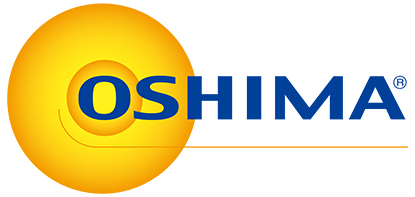Garment machine providers help garment factories automate processes and reduce costs, but choosing the right machine provider is crucial for success.
In a post-pandemic norm, industries have built resilience via digital transformation of their operations. This includes remote working systems, data collection, and a modern way of working to keep business running despite the latest pandemic surprises.
Garment manufacturing can also benefit from digital transformation. OSHIMA is helping manufacturers build resilience with our range of IoT-enabled machines that connect with each other and share production data, presented on the machine’s convenient built-in dashboard. Factory managers can use this data to optimize the entire production process, saving time and money, and delighting their customers with better quality products.
Our range of connected machines allow information to be shared between servers, enabling managers to make swift business decisions on the go. Our smart range of devices are equipped with an ERP system to log information such as QC pass and fail rates for remote control and monitoring. We constantly invest in research and development, and will be launching AI-enabled machines. But first let's go over the basics.
What is a garment machine?
Garment manufacturing employs a variety of machines to streamline the production process, increasing efficiency and productivity. These include spreading machines, which unroll and arrange fabrics for cutting, and cutting machines, which precisely shape these fabrics according to design specifications. Additionally, fabric inspection and fusing machines play critical roles in ensuring quality control. For manufacturers with high-volume production, these machines are indispensable, as they not only improve productivity, but also enhance the potential for a higher return on investment.
Why factories need garment machines?
The benefits of garment machines compared to manual labor are countless. Machines are equipped to work in challenging conditions, such as a hot shop floor, without factory workers getting tired. These machines produce high amounts of fabric at once, and can be set to handle various workloads.
Globalization and the increased demand for fabric mean that factories are expected to deliver high quality goods fast. But a global worker shortage is forcing factories to decrease manual labor and focus on automation through machines.
-
Enhanced accuracy
Garment machines can be configured to accommodate different fabric types and styles, and are more versatile than manual labor. They reduce the risk of human error by providing automated and consistent finished goods. Machines are highly accurate and reduce fabric wastage through misjudgement or poor fabric handling techniques, delivering a more accurate end product for customers.
-
Reduced manpower
Expecting factory staff to accurately spread or cut high amounts of fabric for hours per day is unrealistic, as worker fatigue will set in and increase the likelihood of injury. Workers are also prone to illness and strain injuries from repeated movements. Using machines removes this risk and factory staff can be sent elsewhere, enhancing efficiency and productivity.
-
Increased production capacity
Humans have their physical limits, but machines can handle large amounts of heavy fabric for many hours a day. Higher production capacity means that factories can take more orders, increasing turnover and return on investment.
How to choose the best garment machine provider?
No two garment factories are the same. Choosing a garment machine provider depends on the type of factory and specific production requirements. Factories should avoid looking for the cheapest garment machines, and focus on finding a professional provider that understands their specific needs. Staff at garment machine providers should be ready to answer questions and provide information based on experience.
-
Professional and supportive
It’s important to look for garment machine providers that are professional and informative. They should understand the needs of factories and have relevant experience in the garment manufacturing field, offering support and advice to customers rather than pressure selling. Factory owners are advised to shop around and find a garment manufacturer that truly recognizes their production requirements and goals.
As a garment machine provider with over five decades of manufacturing experience, OSHIMA has technical expertise to understand customers’ needs. We are trusted internationally and provide professional and supportive advice to factories looking to automate their production process. We focus on building long-term relationships with our customers, working together to enhance productivity and efficiency.
-
Technical innovation
Most buyers prefer suppliers that are always innovating; it is critical to provide clients with competitive goods. We are a world leader in automated fabric spreader and needle detection. In order to help businesses in adopting Industry 4.0 and their digital transformation, we are providing hardware, software, data, and service integration services.
-
Aftersales service
Machine breakdowns are troublesome and lead to production delays, which can have a huge financial impact on fabric producers. Breakdowns can take weeks to assess and repair as machine suppliers contact the original manufacturer for advice. Worse still, some suppliers may claim non-fault or not respond to breakdown reports. This is bad news for garment factories that are expected to stick to tight production deadlines.
As a one-stop-shop, we provide a high quality after-sales service for our customers. Garment factories deal with the original manufacturer when buying from Oshima, and we know our machines better than anyone else. Our after-sales team is on-hand to support any queries customers may have, providing the best solutions for maximum efficiency. Factories won’t have to deal with a third party dealer when purchasing from Oshima, giving them peace of mind to focus on producing high quality garments.
-
One-stop-shop
Most well-known garment machine providers specialize in providing one or two machines, meaning that factories must look elsewhere to complete their range. Factories are forced to deal with multiple suppliers at once, each with their own sales and service terms. Every machine is different, and workers must learn how to use them to enhance factory efficiency. But this can be difficult to achieve when machines are made by different suppliers.
Providing over 85 percent of the machines required by garment factories — including fabric inspection, spreading, cutting and fusing machines — we provide a one-stop-shop for our customers via a series of machines that are modular and work together based on customer needs. This removes the need to buy from multiple providers. Buying from OSHIMA means dealing directly with the manufacturer, and we recommend products based on our customers’ unique needs. Production lines are optimized and factory floors look more professional when using products from the same brand, helping customers to boost their image, too.
Conclusion
Machinery is one of the largest investments a fabric manufacturer will make. Factories can only produce high quality end products if they have the right equipment from a reputable supplier. Garment machine providers should be experts in their field, offering support and after-sales services as required. Oshima is one of the few garment machinery providers that offers an extensive collection of devices. We manufacture our products in-house and will recommend the most suitable machines for our customers. We hold approximately 85% of the machines required by factories, making us the first choice for garment production machinery worldwide. Talk to us today to discuss your garment machinery needs.




